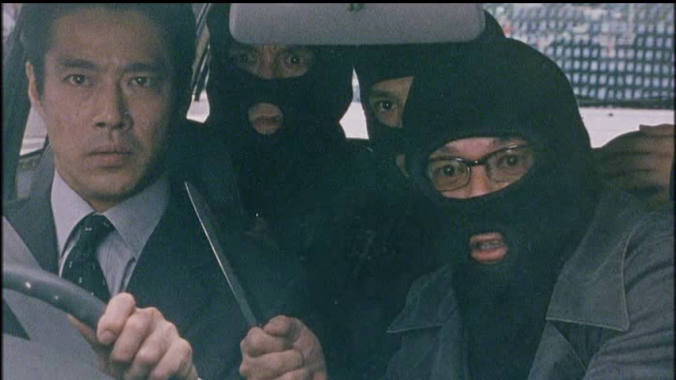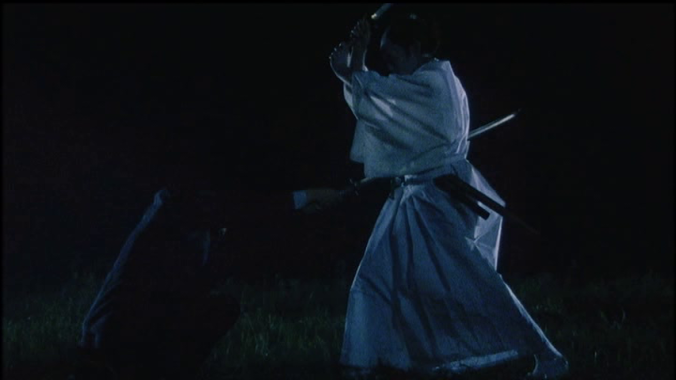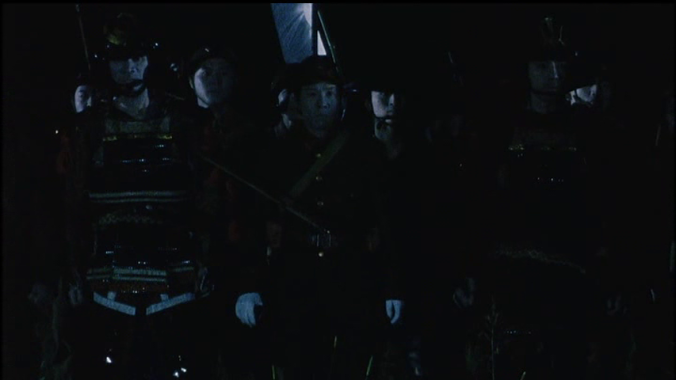 As it happens, drive is one thing the hero of Drive does not have. He does have a company car which he drives with absolute obedience to the rules, as he does everything else in his life. Every day at 11:00, Asakura times a stop at a red light outside a bank so he can watch a pretty young woman come out for her lunch break. Today, however, as he watches the girl knock over flowers in a shop, three masked men jump into the car and order him to “follow that car.” They have just robbed the bank, but the driver of their get-away car took off with the money alone. Thus begins a harrowing day for him, a spiritual journey for the robbers, and an often hilarious day for the audience. As with writer/director/editor SABU’s earlier Monday, everything is set off by accident and continues by coincidence, but where Monday took a tragic turn for the hero, Drive finds a form of fulfillment for everyone except the the man who took off with all the money.
As it happens, drive is one thing the hero of Drive does not have. He does have a company car which he drives with absolute obedience to the rules, as he does everything else in his life. Every day at 11:00, Asakura times a stop at a red light outside a bank so he can watch a pretty young woman come out for her lunch break. Today, however, as he watches the girl knock over flowers in a shop, three masked men jump into the car and order him to “follow that car.” They have just robbed the bank, but the driver of their get-away car took off with the money alone. Thus begins a harrowing day for him, a spiritual journey for the robbers, and an often hilarious day for the audience. As with writer/director/editor SABU’s earlier Monday, everything is set off by accident and continues by coincidence, but where Monday took a tragic turn for the hero, Drive finds a form of fulfillment for everyone except the the man who took off with all the money.
Since Asakura ( Shinichi Tsutsumi) always drives at exactly the speed limit, never runs red lights, and refuses to go the wrong way down one-way streets, they soon lose the man with the money and are left wandering around Tokyo trying to figure out what to do next, unwilling to just get out of the car and leave Asakura, lest he identify them to the police. (It would help if the sub-titles had translated the name on the company car so we knew why Asakura was able to drive around so regularly and not be missed by his employers.)
The man with the money has parked his own sports car off a back road but he drops his keys into a hole in the field and gets his arm stuck trying to fish them out. This leads to a day and night of hallucinations. Meanwhile, back in the car, we learn that Arai, the apparent leader of the gang, is the son of a priest. He begins to talk about karma, claiming that there are no real coincidences but events set in motion generations ago. This provides an unusual philosophical foundation to the coincidences that occur, suggesting that they are not merely flukes designed by the screenwriter but actual fates finally brought to fruition by the absurdity of the situation.
And the situations are indeed absurd. They stop the car and Arai attacks a junkie in an alleyway, which finds him pushed through a door and onto the stage with a violent punk band. He continues his rant against youth wasting their lives that he started with the junkie as he faces the dancing crowd but is taken as part of the punk attitude of the band and is so successful that he is adopted by the band members to replace the junkie.
As the three remaining men drive away, another coincidence brings Makato’s girlfriend beside them on her scooter at a red light. She jumps in the car and the couple start to have sex in the back seat, which leads Asakura to stop at a batting cage so the pair can be left alone. After the car stops bouncing, Asakura is joined by Makato in the batting cage, where a baseball scout signs him up because of his beautiful swing. And then there were two. Another accident brings Nishi to the doors of a hospital where he finds his wife and brings her to die peacefully at home. Now alone at last in the car, Asakura hears Arai’s phone ring and he is drawn to the field where the thief is still trapped, where he faces his own demons in a duel with a ghostly samurai (also played by Tsutsumi) that finally releases him from the migraines he has felt since his father and mother committed suicide and left him with his nutty, drunkard aunt.
As in Monday, SABU builds his plot on accidents – the flower pots knocked over by the girl, a wine glass spilled by Asakura setting off a slapstick chain of falls and collisions ending in the death of a man on his way to inform on the gang – to drive the story forward. However, this time karma is on the hero’s side and he finds his own happy ending.
Tsutsumi is stiff and rigid, a personification of tension long before the robbers jump in his car. The doctor credits his migraines to his tension, but he can never relax, even in the batting cage where he misses every swing. Nor can he panic when the robbers threaten him; it’s just something else to give him a migraine, but not enough to make him break his life-long devotion to rules and schedules. He is what he is, though he does eventually defeat some of his demons and find happiness. Unlike in American versions of such a plot, however, he does not become a new man, does not take over the gang, or even get to keep the money once it is found, but still ends the movie driving at exactly the speed limit while other drivers yell insults as they pass him, only now he is able to smile.
As the summary suggests, the coincidences for his passengers are not really plausible but then it is a spiritual heist movie, a working out of karma as Arai tries to explain, a chance for each of them to find their designated place in life by what only appears to be accident. This may be a bit more philosophical than the light-weight story can support, but it does make the movie something more than the usual comedy of the meek average man suddenly caught in the middle of someone else’s crime.

The hallucinations of the man trapped by the hole likewise seem to be an attempt to summon up all of Japan’s past as he imagines demons, samurai, and soldiers from WWII advancing on him. Asakura’s duel with his samurai self is witnessed by representatives of all the armies of the past, putting a bit more profundity onto its resolution than the lightweight plot line can really support. Nevertheless, the movie never fails to hold our interest and manages to seem just plausible enough as it occurs, no matter how unlikely it may seem in retrospect, while also never being predictable in ways the initial set-up would suggest.
In addition to SABU’s regular leading man Tsutsumi, the cast includes Ren Osugi, Masanobu Ando, and Susumu Terajima as the robbers, all of whom would be regulars in both his and Kitano’s movies. From the movies I have seen so far, SABU seems to be a natural movie maker, mixing modes and approaches with apparent ease. This makes Drive an unusual and very entertaining (yet very Japanese) variant on the heist formula.



